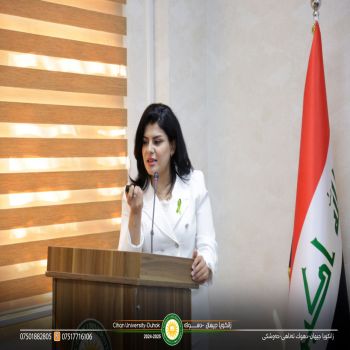
Phone : +964 (750) 881-8667
Birth Date: 1993-03-01
Nationality: Iraq
Address: Barzani street
Shireen Bashar Ali
Department of Nursing
Speciality
Area Interest
Teaching Materials
Languages
Kurdish (Native)
Arabic (Proficient)
English (Intermediate)
Skills
Skills
1. Clinical Excellence and Compassionate Patient Care 2. Expertise in Critical Thinking and Decision-Making 3. Effective Communication for Patient Advocacy 4. Proficiency in Medication Administration and Treatment 5. Collaborative Team Player in Healthcare Settings 6. Patient Education and Empowerment 7. Infection Control and Safety Protocols 8. Strong Documentation and Charting Skills 9. Efficient Time Management in High-Pressure Environments 10.Continuous Learning and Professional Development in Nursing
Hobbies
hobbies
Reading: Whether it's fiction, non-fiction, or academic literature, reading can be a great way to relax and expand your knowledge Playing a Musical Instrument: Learning to play a musical instrument or honing your skills if you already play can be a fulfilling and therapeutic hobby. Gardening: Cultivating a garden, growing plants, and spending time outdoors can be a relaxing and rewarding hobby.
Presentation
Nursing Department hosts a workshop on “Nursing Skills and Techniques” On April 23rd, 2024, the Nursing Department at Cihan University-Duhok hosted a workshop entitled “Nursing Skills and Techniques.” The workshop provided the opportunity for first-year nursing students to view and participate in hands-on exercises related to basic nursing procedures, including insertion of nasogastric tubes, administration of infusions, administration of intravenous care, assessment of vital signs, insertion of intravenous cannulation, and handling of intravenous fluid therapy.
Workshop
The effects of addictive drugs on individuals can vary depending on the substance and the individual's unique characteristics. Addiction to drugs can have profound physical, psychological, and social consequences.
Publication Journal
Lifestyle Practices of Pregnant Women in the City of Mosul, Iraq
Introduction: This study aims to describe the lifestyle practices of pregnant women in Mosul, Iraq, and to identify potential barriers to healthy behaviors in this population. Methods: The study is a cross-sectional study that aims to examine the lifestyle practices of pregnant women in the city of Mosul, Iraq. A sample of 300 pregnant women was included in the study. The Maternal Health Promoting Lifestyle Profile (MHPLP), which is based on the Health Promotion Model, was modified and used to measure maternal practices. Data was collected through face-to-face interviews with the participants using the modified MHPLP questionnaire. The collected data was analyzed using statistical methods such as descriptive statistics and chi-squared test. Results: The study examined the demographic and social characteristics of participants, revealing a mean age of 29.4 years and an average family size of 5 members. Participants showed a mean gestational weight gain of 5.7 kg, with educational levels split between 55% high and 45% low. The majority belonged to nuclear families (72.2%), and the primary support system was the husband (77.8%). Analysis of Maternal Health Promotion Lifestyle Profile (MHPLP) subscales (Table 3) indicated moderate scores overall, with “Health responsibility” scoring highest (3.22) and “Interpersonal support” scoring lowest (2.16). Furthermore, Table 4 highlighted a significant difference (p < 0.007) in self-actualization scores between primiparous and multiparous women, with primiparous women scoring higher (mean = 3.24) compared to multiparous women (mean = 3.05). These findings provide comprehensive insights into the participants’ characteristics and underscore variations in self-actualization based on parity. Conclusion: The research has implications for the quality of maternal and child health services. Health promotion and healthy lifestyle should be integrated into services provided to pregnant women. Further research is needed to develop an instrument to understand pregnant women’s cultural beliefs regarding lifestyle practices such as physical activities and stress management. Policy implications are also discussed.
Social Link
Facebook
Linkedin